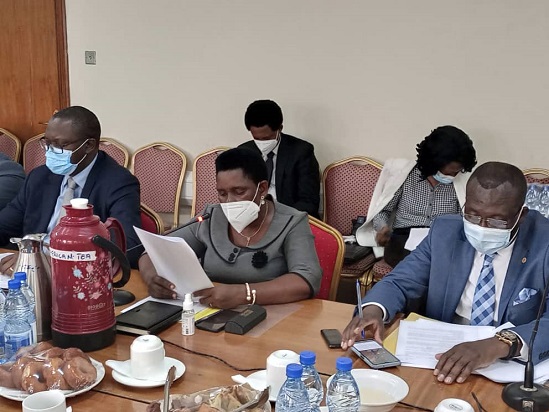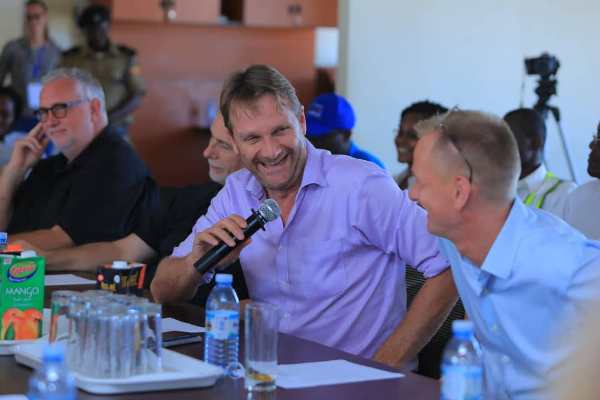President Museveni speaking at the closure of the 3-day event
President Yoweri Museveni has called on participants from member countries of the South-South and Triangular Cooperation (SSTrC) to work together to ensure global affluence for all their people.
SSTrC is a development and humanitarian programming modality mandated by the Member States of the United Nations as articulated in numerous International Agreements and UN General Assembly resolutions.
Under the theme “Building National Capacities for South-South and Triangular Cooperation Ecosystem in Africa and forging horizontal partnerships for sustainable and resilient societies”, The 2nd Africa High Level Forum was hosted by National Planning Authority (NPA), the APRM National Secretariat and the government of Uganda’s strageic planning body/institution.
Speaking during the closure of a 3-day SSTC at Speke Resort Munyonyo, President Museveni disclosed that in order to achieve global affluence, member states need to support each other by creating a sustainable market for their goods and services.
“It is now time to cooperate on ensuring affluence for all our people and what does it mean because when I produce a good or a service, we need a consumer to buy what I produce. If I produced a good or a service and nobody buys it, then I’m stuck, we cannot have affluence. It’s now time to address the issue of global affluence; we don’t want partial affluence in only a few countries. That is a system of parasites, we don’t want parasitism, we want symbiosis where people equally gain from working together,” Gen. Museveni said.
The President added that, “The situation has now changed; China has now changed that cycle of poverty, they have built a fairly prosperous society, India, even some sections of the African population have gained affluence. However, that is not enough. That is why a conference like this is good and when we talk of affluence we mean good food, everybody should have good food, not to over eat but eat sufficiently, clothes-what to wear, shelter- good houses, locomotive- moving around by what means of transport?, energy for cooking, lighting and refrigeration.”
He also noted that member countries need to sustainably preserve the natural resources such as water bodies, forests, wetlands among others to fight climate change. The President further commended the long-standing relationship that has existed between South-South member countries saying that they have collaborated since the times of fighting colonialism. Gen. Museveni also used the platform to call for trade among the cooperation partners and North-South members, saying that this will address the challenge of market for sustainable development.
“As we talk about South-South Cooperation we should also talk about North-South Cooperation trade to expand our market,” he noted.
The President also emphasised the role of research and technology saying that Africa has been lagging behind because of limited involvement in the two sectors.
Minister (Minister of State for Planning) under the Ministry of Finance, Planning, and Economic Development, Hon. Amos Lugoloobi thanked the President for ensuring that Uganda successfully hosts the Forum.
“This 2nd Africa High Level Forum of South-South Triangular Cooperation for Sustainable Development is built on the outcome of the First Forum which was organized in Cairo, Egypt in 2021.We are therefore optimistic that this Kampala Forum will achieve its overall objective of uplifting development cooperation particularly South-South and Triangular Cooperation at the bilateral, regional and continental levels,” Hon. Lugoloobi said.
In his speech, Lugoloobi revealed that the low level of intra-Africa trade, currently at about 16% – 18% of total trade in Africa, was noted to have been aggravated by weak economic recovery in Africa and elsewhere in the global south.
“The Forum urged SSTrC member countries to urgently design and implement strategies and Plans to reverse the situation where African countries are largely dependent on the industrial north in terms of trade and investment and trade.Timely action was highlighted to prevent further vulnerability and indebt-ness. It was noted that the foundation for increased horizontal cooperation among African states has been laid by initiatives such as the Africa Continental Free Trade Area (AfCFTA). Increased cooperation was also identified in areas of investment, research and technology development, as well as capacity development,” he said.
According to the minister, the Forum noted the need for South-to-South member countries to embark on designing strategies for utilizing the support recently announced by the United States Government of USD 55 Billion towards implementation of the Africa Agenda 2063.
“The African Development Bank (AfDB) also outlined available support under its portfolio towards infrastructure and Human Capital development projects in Africa, and especially in Uganda,” he said.
Prof Pamela Mbabazi, the chairperson of National Planning Authority, said the Forum was timely at the time of major global political, epidemiological and environmental crises.
“This Forum also gives us the opportunity to discuss ways of tapping the significant potential for SSTrC in Africa that remains untapped due to insufficient political support, inadequate policy and regulatory frameworks, disconnection between SSTrC initiatives and local realities, and inadequate funding,” she noted.
Resolutions from the forum
The Forum noted the support available under the Islamic Development Bank (IsDB) for capacity development specifically, for enhancing national ecosystems for SSTrC”. Member countries were urged to take advantage of this support opportunity. IsDB also pledged more support towards implementation of programmes and projects that have linkage to SDGs and Agenda 2063.
SSTrC countries were urged to leverage South-South cooperation to achieve sustainable development by sharing development solutions, transferring knowledge, and providing mutual support and technical assistance. In this regard, adequate strategies, frameworks and guidelines will be required to be designed for mutually beneficial and meaningful long-term SSTrC engagements, including those on global issues like climate change, refugee management, global pandemic management, food security, and others.
The Forum urged the Global South to: (a) explore ways to make the implementation of development agendas more robust in order to achieve their aspirations; (b) discover innovative pathways for lifting the 1.3 billion people out of multidimensional poverty in the global South; (c) identify genuine actions in support of regional interventions aimed at stabilizing of the Great Lakes Region and the Horn of Africa as an enabler of all forms of growth and integration; and (d) mobilize large-scale South-South and triangular cooperation initiatives that can improve the condition of people, help compensate for education losses due to COVID-19, and leverage science, technology, innovation and technical and vocational education.





